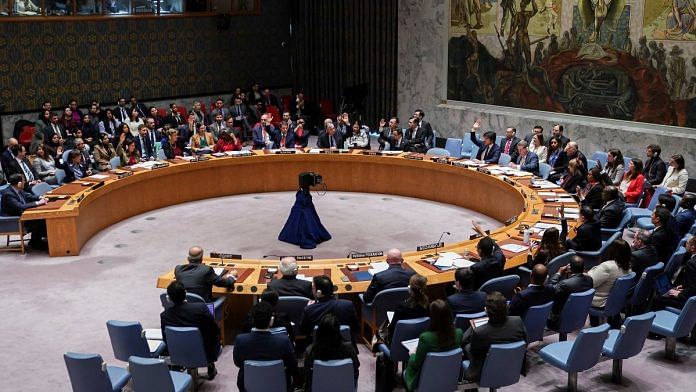At a time when India is seriously advocating structural and functional reforms in the United Nations, the global forum’s president, Dennis Francis, has expressed optimism about India’s potential to secure a permanent seat on the UN Security Council.
In September 2023, in the run-up to the culmination of India’s G20 presidentship, foreign minister S Jaishankar had indicated a positive response from the global democracies for India’s candidature of UNSC permanent seat. This was followed by a joint India-US statement after bilateral talks between Prime Minister Narendra Modi and President Joe Biden. The statement reiterated India’s stand that “global governance must be more inclusive and representative through a reformed UN Security Council so it may better reflect contemporary realities and remain committed to a comprehensive UN reform agenda with India as a permanent member.”
Ironically though, the joint statement welcomed India’s candidature for the “UNSC non-permanent seat in 2028-29.” Countries in the West, especially the US, a permanent member of the UNSC, sound extremely hollow when they pontificate on strengthening democracy and the fight against terrorism even as they keep India, one of the oldest members of the UN and the largest democracy, out of the high table consisting of P5, two of them not democracies.
Also read: All about UN Security Council and India’s non-permanent membership for the 8th time
An archaic UN
The US is not alone in advocating the expansion of non-permanent membership of the UNSC. The Uniting for Consensus (UFC) group consisting of twelve countries recently suggested the expansion of non-permanent elected members of UNSC from 15 to 26. The UFC, floated in 1990 to essentially oppose “new permanent national seats”, argues that while the current status of the P5 members is rooted in the historical circumstances following the end of the World War 2, it is against any reform that would envisage the creation of “additional and unjustifiable privileged positions” within the international community, to the detriment of the general interest of the UN membership.
India has rightly junked the suggestion in the context of changing global geopolitical realities and the urgent need for a more relevant, credible, and representative UN 2.0 to ensure peace and security.
In February 2023, Deputy Prime Minister of Italy, Antonio Tajani, met the State Councillor and Director of the Office of the Central Commission for Foreign Affairs of the Communist Party of China (CPC) Central Committee, Wang Yi, to discuss bilateral agreements and the war in Ukraine. Incidentally, Tajani expressed his appreciation for the fruitful and constant link between China and Italy concerning the UNSC reform and their coordination within the UFC group, of which China has been appointed observer. With China as an observer, neither India nor those who wish to see genuine reforms and expansion of the P5 should have any hope of justice.
PM Modi, while addressing the 76th UNGA in September 2021, called for “comprehensive UN reforms” and reminded that “we cannot fight today’s challenges with outdated structures”. Climate change, the fight against terrorism, and achieving sustainable development goals (SDGs) were not part of the UN’s agenda seven decades ago. These are pressing issues today. World War 2 has left several flashpoints that now disrupt peace and economic progress. The Covid-19 pandemic exposed the soft underbelly of the health infrastructure of the world. Much more needs to be done unitedly to defeat the use of selective veto power by members with hegemonic objectives. No global forum with such an archaic and highly polarised structure can succeed in a multipolar world.
Also read: India never had an offer to become permanent UNSC member — this is a fact
When India helped China
As against China’s overwhelming presence in UFC, the G4 Group of four countries (India, Brazil, Japan, and Germany) met in September 2023 on the sidelines of the 78th UNGA and reaffirmed its resolve to pursue the UN reform process, including expanding the P5, a stand on which India is uncompromising. Ironically, while there is general consensus on retrieving the UN body from its archaic structure—a World War 2 legacy—China, Russia, and South Korea are opposed to Japan’s inclusion in G4 while ridiculously asking the country to atone for the war crimes committed during World War 2. China is the biggest stumbling block in India’s quest for a permanent seat in the UNSC.
China should not forget how it became a permanent member and must feel obliged to India, especially the (misplaced) munificence of Prime Minister Jawaharlal Nehru, who was informally offered the UNSC seat by the US in 1950 and then by the Soviet Union in 1955.
Further, Nehru’s letter to his sister and India’s then-representative in the UN, Vijayalakshmi, would confirm the centrality of China in the larger scheme of “Nehruvian Foreign Policy.” His belief that China is too big and important a country to be ignored by the international community was shattered to smithereens when China attacked Tibet in 1950 and forcefully occupied Tibet in 1959 and later attacked India in 1962, which some say was too much of a shock for him to endure.
India carries the historical burden of not just restoring Tibet to Tibetans but also freeing other areas such as Xinjiang and Pakistan-occupied Indian territory. The global community needs to realise that unless the foremost global body, the UN, is restructured and democratised, freed from the clutches of historical past and adapts to the realities of present geopolitics of multilateralism, peace and prosperity will just be a far cry.
Seshadri Chari is the former editor of ‘Organiser’. He tweets @seshadrichari. Views are personal.
(Edited by Prashant)




In the fullness of time, the permanent seat will come. In the meantime, India should be part of the solutions to many intractable global problems. Conflicts in Ukraine and Gaza. Afghanistan. Burma. Climate change. Strengthening the institutions that promote orderly globalisation. Not merely demanding a permanent seat and veto as an acknowledgment that we have arrived on the global stage.